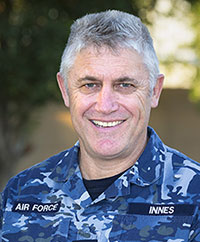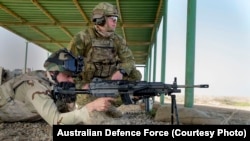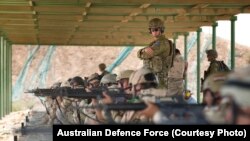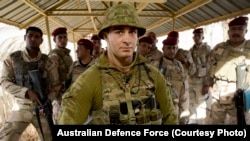As part of VOA's ongoing reporting on Iraq, correspondent Sharon Behn interviewed Air Vice Marshal Tim Innes, national theater commander for all Australian forces deployed to the Middle East region, including Afghanistan. Innes assumed command of Australia's Joint Task Group 633 on January 25, 2016. The following article is based in part on that interview.
Islamic State extremists fighting in Iraq and Syria have proven themselves experts in modern warfare. They create diversionary fronts, use suicide bombers with devastating effect, and constantly change their offensive and defensive tactics.
Countering and defeating those tactics is one of the main objectives of thousands of U.S. and coalition soldiers currently training Iraqi forces — not only in bases, but walking alongside them as they enter the battleground.

RAAF Air Vice-Marshal Tim Innes
"[IS militants] are definitely changing tactics," Air Vice Marshal Tim Innes, the national theater commander for all Australian forces deployed to the Middle East region, told VOA, using an acronym for Islamic State. "We try to stay inside their adaptation loop."
Despite those efforts, Iraqi and coalition forces have been caught off guard.
Training challenges
In the recent battle for Ramadi, for example, "we had been training the Iraqi Security Forces to deal with insurgent threats, but then because of the way IS had prepared its defenses, the counterinsurgency tactics needed to change more to mine-clearing and regular infantry tactics," said Patrick Martin, Iraq analyst for the Institute for the Study of War.
"It can be a short time sometimes between the differences in tactics and training," Innes acknowledged. But, he said, "We also have advise-and-assist embedded Australian soldiers that can help closer to the front once we have trained those troops."
The training effort, led by a number of coalition nations including Australia, Spain, Portugal, Italy, the Netherlands and France, has its own challenges.
"I think there are two major obstacles to training. The first one would be language, and the second one would be culture," Innes said. "We get around the language challenge by the extensive use of interpreters, and the cultural one is one that we are aware of and learn and adapt as we go along."
Cultural differences reach into unexpected areas, like educating Iraqi forces on dealing with IS militants' use of social media across the battle space. "It becomes quite difficult," Innes said.
"The basic principles of security, personal security and operational information, et cetera, is a common theme we can teach."
Complex battleground
Operating parallel to U.S. and coalition forces — who train Iraqi Security Forces and the Kurdish Peshmerga — is Iran, which has thrown its considerable military expertise behind the predominantly Shi'ite militias operating in Iraq.
Iran, in the opinion of Jonathan Schanzer, VP for research at the Foundation for Defense of Democracies, is the country "most effective in training, fighting and intelligence collection operation."
"When people talk about what's going on, it is the positive influence exerted by Western countries, [yet] Iran is by far the most effective, but not in a positive way," Schanzer told VOA.
"It may be helping fight IS with Shia militia, but the deployment of the IRGC [Iranian Revolutionary Guard Corps] and others to help secure Iraq is effectively turning Iraq into an Iranian proxy," he said.
Many fear that Iran's presence is aggravating the already deep sectarian divide in Iraq that the mainly Sunni-based Islamic State has traded on.
Repeated bloodletting between Shi'ite and Sunni communities in Iraq has seeped deep into the roots of the country, poisoning everything from intelligence gathering to attempts at reconciliation.
"It's a complex space, as you know,” Innes said. “A myriad of interest groups across Iraq still proliferate. It's a complex battle space that we have got to work through."
Global battle
Even as coalition forces battle IS in Iraq and Syria, the extremists, also known as Daesh, have spread their tentacles into Libya, setting up a third stronghold in Sirte in eastern Libya.
"They are a global threat, and that is one of the main reasons why Australia has us in Iraq with the coalition, to try to reduce that threat from its source, but undoubtedly it is a wider organization and a threat to the globe," Innes said.
"To say that you will totally wipe it out as an ideal, I think most people realize is not possible,” he added. “So if you are asking me do I think defeating Daesh would kill off the ideal or the notion of it globally, I think that would be a brave statement."
Created in World War I, the Australian and New Zealand Army Corps, known as Anzac, has served alongside U.S. and allied forces in WWI, WWII, the Korean War, the Vietnam War, the First Gulf War, the Iraq War, Afghanistan and now again in Iraq, where it is training and advising Iraqi troops in the fight against Islamic State extremists.








